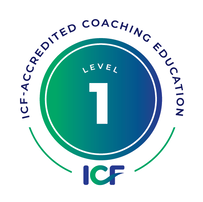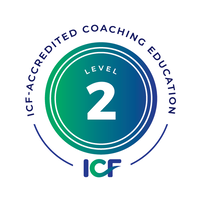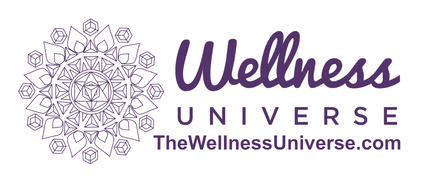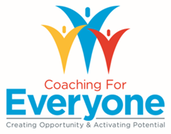|
Laurel Elders:
We're having a rich discussion about integrative intelligence. We're a minute late. We apologize. Bryant Alexander: Glad to be here with you, Laurel. Another week. Laurel Elders: Another week. Yes. I'm so excited for this week. So welcome, everyone, to coaching quips. These are weekly coaching mastery tips designed to equip coaches, future coaches, and coach-like leaders with empowering approaches. I'm Laurel Elders, founder of the Institute for Integrative Intelligence. I'm an ICF master certified coach, and I got my start as a professional coach in 2005, and I'm excited to have my co-host with me today, Bryant Alexander. Bryant is also a coach, and he works with us in admissions, helping people align with the coach training options that really are best suited for them and their organization. Bryant, so great to have you. Bryant Alexander: Yes, glad to be. I also want to say I am a student at the Institute for Integrative Intelligence. So it's just know I wrapped up an intensive for the last intensive this weekend. Powerful experience. I got to learn a little bit about values. Got to learn a little bit about neurobiology of coaching. Got a chance to learn a lot about just what integration actually means. So, powerful experience, and grateful for the instructors here. Laurel Elders: Awesome. Thank you. I love what you just said, too, about, um, what integration actually means, because I wrapped my head around that for, like, I had a hard time - I should say, wrapping my head around that for years. And that's part of what we're going to be talking about today, too. Bryant Alexander: Sounds good. Laurel Elders: All right, so I say, let's just talk about the elephant in the room. What the heck is integrative intelligence? Bryant Alexander: It's one of those topics, where I was unfamiliar with it when it came. I've been coaching, but never heard of what that was. And I was just, okay, like, this is interesting. Even the Institute for Integrative Intelligence, I was just like, what does this mean? Because when it comes to coach training institutions, you hear about everybody else. And I was like, this one sounds interesting, so let's do more. So I started to do my research, and I was like, "okay, I kind of get it", but since going through the program, I've definitely got a better understanding of it. But, Laurel, if you want to break it down for us, please. Laurel Elders: I'd love to. I love taking abstract concepts, know, really conceptualizing them. So I think one of the things that we were grappling with as the institute was Integrative Intelligence. It's not just one thing, it's not just a concept. It's a skill set, a mindset. It's a systems approach. It's a leadership empowerment point. It's so many things. So we had been defining it as "the wisdom that develops from cultivating knowledge and understanding of interconnectivity". Well, I ran that by one of my business mentors, and he said, "I'm not an academic. That doesn't make any sense. " I totally get it. I totally get it. And so we realized, because it was so many things, that we're having a hard time succinctly describing it. And so my mentor gave me a challenge. He said, -- just some context. My mom is turning 80 this year. Bryant Alexander: Oh, yes. Happy Birthday! Laurel Elders: And she was a school teacher, elementary school teacher for years, and became an educational consultant in early childhood development, reading comprehension. So she gets the simplicity. Like, how important it is to have simplicity. So he said, "Laurel, come up with a definition that your mom could understand." Okay, challenge accepted. So, we've actually created a little video about this. I'll put that in the comments after the show. But, I called her and asked her. I ran a new definition by her, and the simplified definition is "understanding that everything is connected in one way or another. Bryant Alexander: Okay, so, simple definition, right. And the thing about that is, it would seem obvious, right? But I think that is something that could be brushed over. So, being that that definition is so simple, what do you mean? "Everything is connected." Laurel Elders: So, in reality, we're all connected to each other as human beings. We are connected to the environment, whether we want to acknowledge it or not. Everything is connected. There's not one thing in this entire universe that is not interconnected. Problems arise when we act as if they're not, when we have linear perspectives that put on these blindfolds to the true interconnected nature. Bryant Alexander: Okay, that makes sense. Okay. Those blinders or mental blockers. What would be an example of that? Laurel Elders: Well, in organizations, it would be removing silos and streamlining teams so that whatever's blocking their cohesion is removed, because, again, you're connecting the dots. In the military, it's understanding second and third order effects. In leadership, it's the integration of the bigger vision, but also engaging the wisdom of your employees that are on the front lines and that sometimes gets left out. Bryant Alexander: Interesting. Laurel Elders: In life, it's connecting to something greater than the self. So this could be a calling. It could be a life purpose. In psychology, it could be activating hidden gifts. In parenting, it could be seeing the seed of potential beyond the behavior. So we're starting to see more integratively and connect dots that linear approaches just have kept us from going there basically. Bryant Alexander: When I think about that, I think about my days as a career coach, and I think about just people's approach to professional development. Very, just a + b = c. So you start off entry level, you move on to mid-level. Then you say, okay, I'm a senior now. Now it's time for me to become a manager. Now it's time for me to become an executive. And it's such a linear route that you might, I guess, if you're not moving from, I guess, an integrative perspective, you're not able to embrace other paths to really figure out what growth could look like for you. That's what I hear when you say that, yes. Laurel Elders: And what's also neat is there is value in let's focus on this linear thing. But the wisdom is, let's not forget that it's connected to other things. So the linear can serve, and it has served. Right, a linear approach. Think about in western emergency medicine, we want our doctors to be 100% dialed in, focused on what is that strategy, and not be thinking about the philosophy of the world in that moment. Right. Bryant Alexander: Maybe. I don't know. Maybe. (laughter) Laurel Elders: So to me, and I think we've touched on this in the past, too, it's like the linear has its place. The problem is when we get stuck in the linear, in the silos, which in the western influence came from Descartes, and we're still in the Cartesian "let's break everything down". Well, in the breaking everything down to better understand it - which is brilliant - it has served science - we forgot to reconnect the dots. So we go to college and we study everything as if it's separate. This is the math department. This is the psychology department - and there's nothing necessarily wrong with that. And the true growth happens when we start reconnecting dots to something much bigger and seeing how everything is, in reality connected. Bryant Alexander: That's one of the reasons I'm glad I went to a liberal arts college, because at the foundation of it, it's just critical thinking, problem solving, being able to pull information from a bunch of different resources, like those who argue for it, those who argue against it, but being able to pick a side, but also still saying, like, here are some parallels between these two different schools of thought. But now here's my, I guess, summary or my stance on this particular subject matter. So it's one of the big reasons I'm glad I went to liberal arts school, but also, even up to this point in my career, even becoming a coach, I think because I was able to see that, okay, I was a sociology major. I know I didn't want to do psychology per se. I like psychology, but I know I didn't want to do that. But I was more so interested in how the world works and why people show up the way that they do, which has some psychological components attached to it. But I like the theorists, I like understanding Karl Marx or Max Weber, and just their ideologies on why society is the way that there is. And I think that ultimately connected to this journey I started on. And I didn't know that I was starting on as a coach initially, because then after that, it's like, okay, let's go into education. Let's understand how students develop. Then I moved on to, and I was also a football coach at the time. Didn't even know that was going to be relevant, but it became relevant. Um, and then from there, moving on to college, uh, age students, uh, college age students, and then from there, adult learners and then leaders. And it's just interesting to see how this one thing, and I probably can trace it back to my childhood, honestly. But just to see how this one seed in college, even the choice that I made in college that I went to, opened up so many different possibilities when I took those blinders off and just able to embrace what that whole experience gave me and how it brought me to where I am now. Laurel Elders: Yeah, what a great example. I'm curious, too, after so having gone through the core training, our focus is integrative intelligence. I'm curious, how has your relationship to the power of integration in people's lives shifted? Bryant Alexander: I think that - and I was telling you this before we got on live - it's more so confirmed that you know me as far as, like, as part as, as far as the gifts, the talents that I was given. I was just helping people, I guess, reframe the way they think about their own growth and development, whether that be personally or professionally. And they're not separate, they're the same. Right. So I think that going through the program, getting a better understanding of what it means to be integrated and what integrative intelligence is, I think that I'm able to see things that kind of like a bird's eye view, I guess. I think that we get so fixated on this one problem, and then what happens is that we think, like that's not connected to anything else. It's not affecting how I show up at home. It's not affecting how I'm showing up at work. It's not affecting how I'm showing up for my kids, whatever it may be. But when you kind of step back and just kind of see, like, all right, what is this connected to? What's the bigger narrative here? Uh, I guess that I'm telling myself, I think what I've learned through this experience is that, yes, everything is connected, but also, there is a process of helping people really get these. Making these disjointed narratives into one narrative that can help them have a little bit more power in their experience. Understanding. It's a choice in how they perceive growth or how they can attain whatever goals that they have, because I think that it's about purpose. I think that people are just searching for that. People want to feel like they're doing something that matters to them, but that matters to the world. And in order to do that, integration is probably the most important thing, because if you're not. If it's just utilizing your professional skills, but it's not really attached to the why, you'll never be 100% into it. But if you can find that balance of my why is here, for me, it's coaching, of course, but also being able to use that why? To use a skill to manifest that why. I think that that is what integration is. Because you show up happier when things get stressful. You're able to manage it a lot better, because you're able to see, like, this is, like, the bigger picture, though. This is the purpose. So, I think that's what integration has. What I've learned and what integration has taught me, you're able to manage those hard times so much easier because it's like, I know what the bigger picture is. You're not trapped in that hamster wheel of, like, I'm just doing this because I got to get by. I'm just doing this to get to point to the next checkpoint that's important, but also just understanding what's the bigger vision here, and how is it going to feel like when you get there? How do you feel when you think about it? How is it going to connect with all these other things within your life? So just understanding, like, you got to understand the big picture. You got to have the vision there. You got to have the why there in order to do anything. And once you're able to understand that why integration happens, because there's a balance between there's a connection between that personal and professional development or growth that you're needing. Laurel Elders: Yeah, I got chills as you were speaking. Bryant Alexander: Uh, wow. Laurel Elders: Especially-- Bryant Alexander: Go ahead. Laurel Elders: I was going to say the point you made about was it the fragmented narratives, like, bringing that together and the power of that cohesion. In class, we somatically teach the concept of integration. Like, okay, you've got your hands, and if you do this for so long, you'll eventually run out of. But if you clasp your hands, all of you, you come into something as a whole person. Like how much stronger that is. You can somatically feel the power of integration in that simple exercise. Bryant Alexander: Even somatics, that's another big topic. But something that really excites me as well. But yes, bringing those experiences together and doing something that's worthwhile to you, but also worthwhile to the world around you. Because I think that. I think about a relationship to self, relationship to others, and a relationship to the world around you. That is true integration. Laurel Elders: Mhm. Yeah, absolutely. And that really brings up why we pivoted. And when the school first got its start, we started out focusing on integrative coaching, which was amazing. Right? And then we realized, wait, integration is empowering all these areas. The leaders. Imagine an integrated leader versus a disintegrated leader. Right? Huge difference. And we've all experienced the disintegrated leaders. Of course, they climbed the corporate ladder, got to level ten on the ladder, but they're still down here experiencing, um, the disintegration. So maybe they're only on level two on their integration work or their developmental work. See the little thumbs? (zoom thumbs up) Bryant Alexander: Zoom had to say, you're doing it. LinkedIn was like, yeah, you're doing it. You're doing it. Laurel Elders: Will it do a heart? (makes heart shape with hands) Bryant Alexander: It did. Laurel Elders: Fully integrated experience here. And we realized that, well, I observed, and I'd love to hear your feedback on this, I observed that 100% of human made issues were because people were not honoring the connected nature of what is. There was a linear process in place. So, greed, think about, you've got blinders on, - every area. If you start to look at it through that lens and see, "oh, wow, the better solutions are actually in the integrative perspectives". Bryant Alexander: Yeah, I think today, with war, dictatorship, in the past, it's a focus on power, it's a focus on greed. And usually this comes from a very - relationship to self. I think that's where it all stems from. And I also think it stems from, as people attain more power, you feel like it's going to leave, so you have to fight for it. And it's a whole story, whole story that you tell yourself, like, hey, if somebody's going to take this from me, yes, that is a lack of integration. And, I guess I have to send a question right back at you. How would it be possible to get more people integrated with themselves? How do you stop, especially in a country like the United States? Right. What are your thoughts on helping people become more integrated? What tools, tactics? What can we do in order to make that happen? Laurel Elders: Oh, wow. So there's so many possibilities here. First of all, I just want to give a shout-out to coaching. Coaching is an integratively intelligent approach. It's putting people in touch with themselves, their gifts. It's helping them shed what is not true, what is not serving. It's helping them serve a positive mission. It's helping organizations turn the ship around and become more agile and, growth oriented. I mean, coaching is doing that work in the world, and there's so many more opportunities, though. I was talking to Howie, who teaches our Neurobiology of Emotional Intelligence and Somatics. Bryant Alexander: Howie is amazing. He's amazing. Laurel Elders: Howie was involved in- it was actually a coaching effort where they went into a high school and just to see was this helpful to teenagers and what they found. It's called TouchPointConnection.org. All the research, it turned into a research project, and so they've got data on how effective it was. The teenagers loved it because they were being put in touch with their core values. Like, "oh, I'm not just someone who wants to go party all the time. I actually have something within me. " Bryant Alexander: Mhm. Laurel Elders: They weren't being told what to do. So the coaches were helping them develop their wisdom from the inside out, like their truth. And it was so effective. And I thought, oh, my gosh, had I had that level of support, or even if it was just a class in junior high, high school where we're talking about core values or emotional intelligence. We're so externally focused. Bryant Alexander: Mhm. Laurel Elders: Which - what does that do? Pinches us off from other parts of ourselves. Bryant Alexander: Yeah. Uh, and it's funny, I think that also speaks to, well, high school students need more guidance, and I think that is true. But I think what we were talking about last week around transformational coaching versus transactional coaching. You need a little bit of the two, because I think, I guess a school administrator's reaction would be, no, we need more structure. They need to be told what to do. I think that just speaks to no matter, especially when we get around those high school ages, nobody wants to be told what to do. And I guess that's the power of coaching. There are probably some transactional pieces there, but the goal is to help people, like you said, develop that wisdom. And a part of that wisdom is helping people come to their own conclusions versus what I say goes. For Howie to go into high school, to connect with high school students on coaching is something that I didn't hear about until he told the story. I felt like, uh, you got to be an adult to actually engage in coaching in a productive way. But for that to happen just shows the power of it. And, um, that wisdom is so important. We all have that wisdom, and I think that. We think that wisdom is something that comes with time, and it does, but some of us have an innate wisdom that has to just be drawn out a little bit more, whether it be, um, the sayings that could be like, it's trusting your gut or being that somatic. So just being in your body, knowing how you feel about something, trusting that something is going to happen because you really believe in it. So it's very interesting work to see how it plays out in the real world. But that was really good. Laurel Elders: Yeah, well, the other thing that I've found is that the Integrative Intelligence perspective was really elevating the coaches that we were teaching. And, I just wanted to speak to that a little bit. And it's so connected to what we're talking about, because if you think about, okay, I understand positive intelligence. Positive intelligence is one aspect of the whole. Bryant Alexander: Mhm. Laurel Elders: It's one thing to understand an intelligence center, and it's another to see how that is connected, but also how the other domains of our potential can elevate these other domains, if that makes sense. Bryant Alexander: It makes sense. Yeah, it makes sense because positive intelligence really focuses. I think positive intelligence does focus on some sensations and some somatics, but I think that it focuses heavily on the brain. And just like "all right, we understand your self sabotage behaviors. That's the left side of your brain that processes data. Now let's go to the right side of your brain, whereas the sage is living at. " And it's just like, what about the body? And I know there's some exercises that positive intelligence has, but I think that it doesn't speak to them on this type of level. And how important to not only understand those sensations, but how to understand those sensations when things are actually happening. Like, when you're stressed out, when you're trying to make a decision, when somebody, like when you have a knee jerk reaction to something, like, how to understand those sensations a little bit deeper, because that is integration, right? You're able to feel, if it's in your foot, if it's in your thigh, if it's in your stomach, if it's in your chest, it's like, what is that? Then you're able to make a decision. Then that's where the positive intelligence, in my opinion, really kicks in, because it's like you're able to tap into the right side of the brain to say let me explore this a bit. All right, let's try to navigate this a little bit to see what's going on here. So, it's really interesting. Laurel Elders: Yeah, it really is. And to me, the integrative intelligence is where it all comes to life. We have multiple intelligences within us, so it's bringing all of them together so that, um, someone can just fully engage all parts of themselves, not just mindset, not just one thing or another. And the end result, it's self actualization. And Dr. Scott Barry Kaufman has done profound research in this area. So, if any of you haven't come across his work, he wrote the book Transcend. He's, put a lot of the science to self actualization. Bryant Alexander: Love it. Laurel Elders: Yeah, Bryant, you'd love his book. Bryant Alexander: Um. Ah, ah. Really, I'm just excited to see where the field of coaching is going, because I think that one it seemed like only a select group had access to it, which were, at one point, I feel like the wealthy, like executives, like people, can actually afford it and saw the value in it, or had reached these peaks in their life where it's like, all right, I need help. But now it's something to where it's, kind of, I guess, democratized in that coaches come in all different forms, but I think this work around integrative intelligence, it seems that - not seems - what I've noticed is that there is no way to coach without dealing with the whole person. Right. And understanding those intelligences within you. Intelligence. Is that the word? But understanding all those different things within you helps for a more fulfilling, purposeful and really values based decision making life. So it's just that you don't question yourself or self. Impostor syndrome isn't one of these things. That's just like, I have impostor syndrome, but that doesn't define you. I think one of the most powerful things I've heard this past weekend, going through intensive was like, you experience emotions. You aren't your emotions. That was one of the most powerful things that I heard, and I was just like, that makes sense, right? Because it comes and it goes, but it's up to you to really understand how you're experiencing it and understanding what you're going to do with it. And that is choice. And in my opinion, that is. That's - it's really interesting. Laurel Elders: Yeah. Yeah, it really is. All right, so we're at time. And Bryant, this has been so fun. Thank you so much for being my co host on this topic and diving deeper. We hope that today's mastery tip has been a lantern to your path. With coaching, it's our mission to elevate human potential through the art and the science of masterful coaching. And if you are an individual or organization, seeking to bring coaching into what you do, reach out. Bryant is here on LinkedIn. If you're joining us from another platform, you can reach Bryant at admissions@integrativeintelligence. Global. Bryant Alexander: Mhm. And Jill will be dropping some links in the chat. We have a March 22nd program starting, if you're interested. So, please- those links will be in the chat for more information, but don't hesitate to reach out to me. Always happy to answer any questions as a coach, as a student, as a lifelong learner, I think that truly transformational experience that I've been through since going through the program -LEVEL TWO- CPIC at the Institute for Integrative Intelligence. So, please don't hesitate to reach out to me. Laurel Elders: All right, thanks, everyone. We'll see you next week. Bryant Alexander: Bye.
0 Comments
Leave a Reply. |


 RSS Feed
RSS Feed





